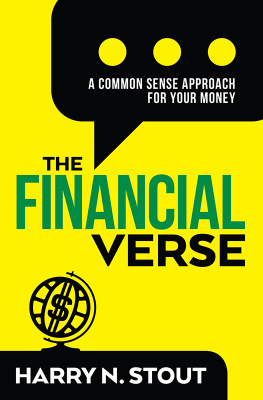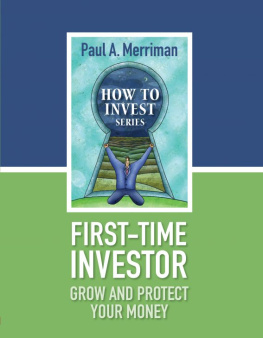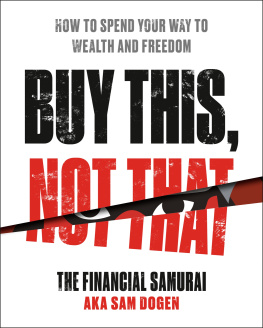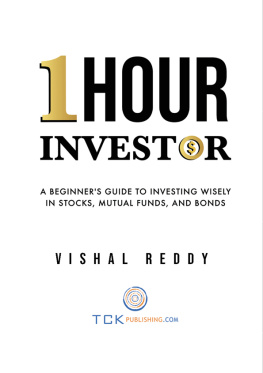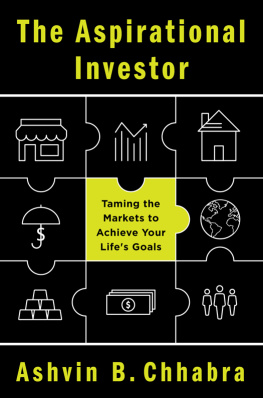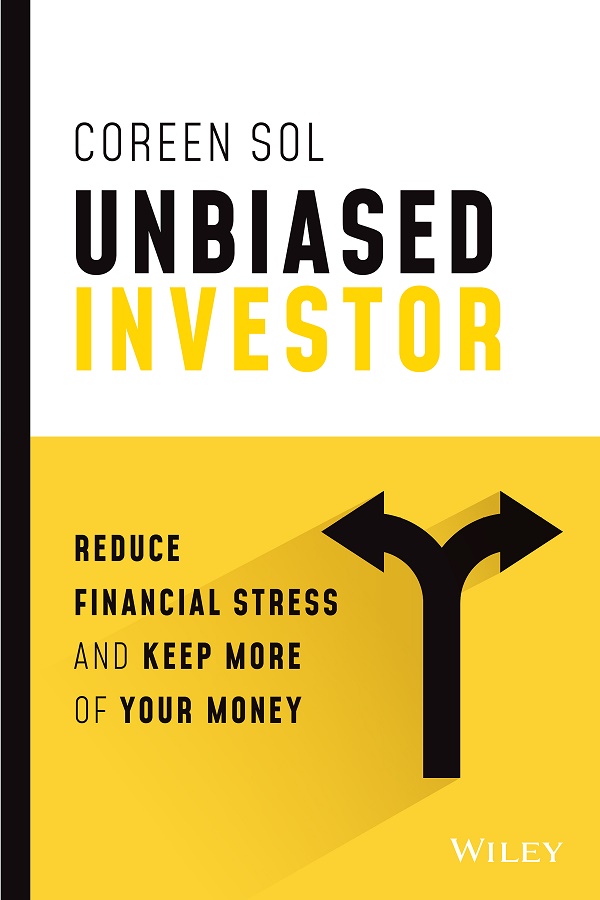
Table of Contents
Guide
Pages
Unbiased Investor
Reduce Financial Stress and Keep More of Your Money
Coreen Sol

Copyright 2023 by John Wiley & Sons, Inc. All rights reserved.
Published by John Wiley & Sons, Inc., Hoboken, New Jersey.
Published simultaneously in Canada.
No part of this publication may be reproduced, stored in a retrieval system, or transmitted in any form or by any means, electronic, mechanical, photocopying, recording, scanning, or otherwise, except as permitted under Section 107 or 108 of the 1976 United States Copyright Act, without either the prior written permission of the Publisher, or authorization through payment of the appropriate percopy fee to the Copyright Clearance Center, Inc., 222 Rosewood Drive, Danvers, MA 01923, (978) 7508400, fax (978) 7504470, or on the web at www.copyright.com. Requests to the Publisher for permission should be addressed to the Permissions Department, John Wiley & Sons, Inc., 111 River Street, Hoboken, NJ 07030, (201) 7486011, fax (201) 7486008, or online at http://www.wiley.com/go/permission.
Limit of Liability/Disclaimer of Warranty: While the publisher and author have used their best efforts in preparing this book, they make no representations or warranties with respect to the accuracy or completeness of the contents of this book and specifically disclaim any implied warranties of merchantability or fitness for a particular purpose. No warranty may be created or extended by sales representatives or written sales materials. The advice and strategies contained herein may not be suitable for your situation. You should consult with a professional where appropriate. Further, readers should be aware that websites listed in this work may have changed or disappeared between when this work was written and when it is read. Neither the publisher nor authors shall be liable for any loss of profit or any other commercial damages, including but not limited to special, incidental, consequential, or other damages.
For general information on our other products and services or for technical support, please contact our Customer Care Department within the United States at (800) 7622974, outside the United States at (317) 5723993 or fax (317) 5724002.
Wiley also publishes its books in a variety of electronic formats. Some content that appears in print may not be available in electronic formats. For more information about Wiley products, visit our web site at www.wiley.com.
Library of Congress CataloginginPublication Data is Available:
ISBN 9781394150083 (Hardback)
ISBN 9781394150106 (ePDF)
ISBN 9781394150090 (epub)
Cover Design: Wiley
Cover Image: phipatbig/Shutterstock
For biased people everywhere, because without the intervention of behaviour, returns would be little more than the inflation rate.
And especially for Jakob, Eiden and Sofia, OFC, my greatest joys.
Introduction
The Path of Least Resistance
Do you tend to act more like water or electricity?
Imagine a single electrical current that feeds two lights. The first light is a 60watt classic incandescent bulb. The other is a modern 8.5watt lowresistance LED (lightemitting diode). When a wire conducts current to both circuits at the same time, surprisingly, both lights brighten up! That is to say, electricity has no preference for the lowerresistance LED bulb.
In contrast, water always takes the path of least resistance. It never runs uphill, and if there's an easier route, water will find it.
In our lives, the path of least resistance is the easiest road to travel, but it's a choice, nevertheless. We are more than capable of solving both simple and complicated problems to venture down both low and highresistance paths. But it's naturally appealing to use the least amount of effort.
Most people understand the effects of procrastination on their ability to complete tasks and reach personal goals. For example, say that you commit to a morning exercise regime before work. As the alarm jumps to life at 6 a.m., it's easy to convince yourself to stay under the blankets instead of leaping out of bed into your shorts and runners. Procrastination is the preference for immediate payoffs over future rewards the cozy bed versus a fit body. Despite your best intentions, this bias begs you to take the path of least resistance.
Beyond the persuasion that bias play over your fitness and other personal goals, it can also prompt you to save and spend money in certain predictable ways that we have come to understand over recent years. While the sway of bias is often subtle, it can produce damaging outcomes when it incites anxiety in your financial decisions or results in judgment errors and even financial loss. And, despite the potentially harmful impact on your financial wellbeing, most people are unaware of the vast majority of these naturally occurring tendencies, when these behaviors occur, and how to intervene.
Over the last three decades, I've been involved in behavioral finance research, both formally, as an adjunct professor at the University of British Columbia Okanagan, and practically, as a CFA charterholder and discretionary portfolio manager. It has been fascinating to observe the wide variety of ways clients formulate decisions during the emotional ups and downs of significant events such as the Asian, Russian, and Argentine economic crises of the 1990s; the September 11, 2001, terrorist attacks; countless energy calamities; acute weather events; the Great Recession of 2008, and the 2020 worldwide pandemic. Despite the variety of circumstances, I have found that most investors are relatively consistent in their behavioral approach, following similar patterns when events recur. As markets drop precipitously, it became predictable which clients would call, who I'd need to reassure, and which people would be motivated to change their investment policies whenever volatility escalates.
It was also telling that when certain clients called the office with fear about the prevailing havoc in the investment markets, the timing of those calls was almost always at or near the trough of the market cycle. It was these experiences that inspired me to learn about the influences over people's ability to make prudent financial decisions. The lessons and strategies I've learned over the last 30 years of managing people and their wealth are in this book.
Errors of judgment are not restricted to the urge to sell your investments at the bottom of a stock market decline. They crop up in your daily routines when you least expect them. They affect how much you spend, how much you save, and how you negotiate contracts. The instances that erode your wealth go largely undetected, with each of us commonly justifying these occurrences by attributing them to some other set of facts.
Consider how frenzied trading activity recently inspired by Reddit and other social media platforms pushed up the stock price of GameStop by a hundredfold over a few weeks. The business prospects of the company were no better after its price skyrocketed than before the increase. Something else must be at work something in the behavior of the masses who participated, all believing that buying the shares was a good idea at that time.
This isn't the only example of investors willing to convince themselves that trading overpriced investments somehow makes sense. The justifications that we manufacture only serve to make us feel better about our momentdriven choices. The security is overpriced, yet we decide to buy it anyway. Then, we followup the transaction with another natural inclination, which is to confirm our decision. If the price appreciates after we make the investment, we believe this to be evidence of a wise choice. The rising price of an overpricedstock, however, doesn't change the fact that it is overvalued. And, despite the enthusiasm of those investors participating in the shortrun gains, the risks of repricing at the lower reasonable value intensify the higher it goes.
Next page

